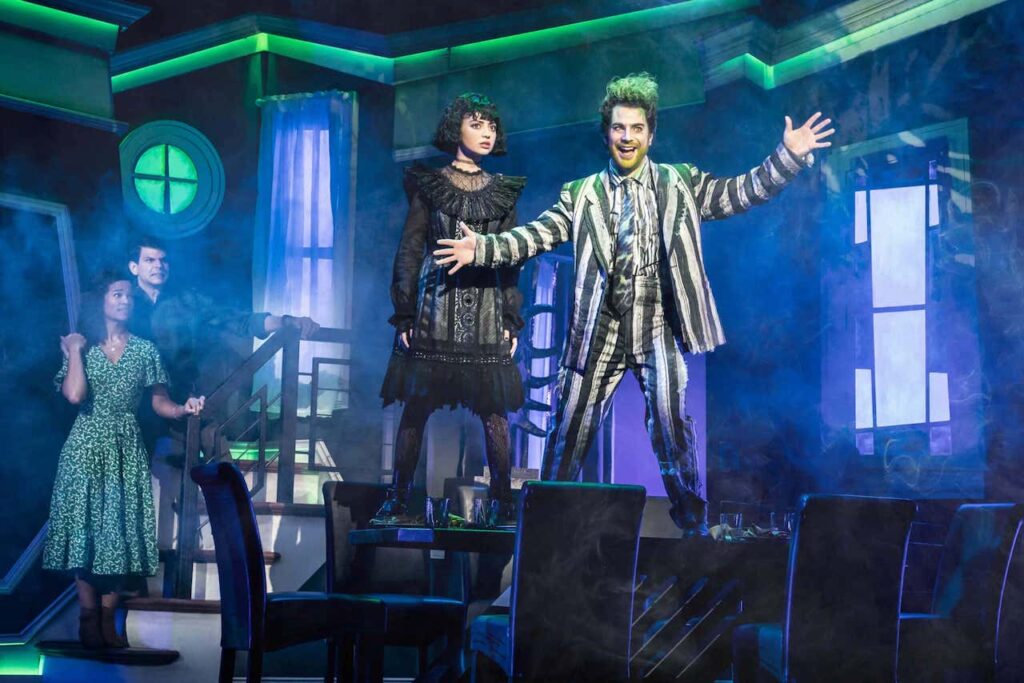
Music theater lovers know that while every cast member can make a difference, some shows’ success ultimately hinges on the performance of a leading role. “Fiddler” falls off the roof without a terrific Tevye; that other matchmaker musical is folly without a great Dolly; and “Gypsy” feels like a gyp if you don’t get a full-bloomed Rose.
Add to this scenery-chewing Hall of Fame the title character of “Beetlejuice.” As played with ghoulish gusto by Justin Collette in the musical’s first-ever national tour, which launched at the Golden Gate theater last week, B.J. is Mama Rose from the Dead.
Serving up garrulous, raunchy charisma in a green-frosted pompadour and the Tim Burton character’s signature striped suit, Collette takes the stage like an electrified, Frankensteined hybrid of Adam Lambert, Nathan Lane and Cab Calloway. He’s a ghost-rustling, fourth-wall-busting joy.
A spotlight-addicted host-with-the most, Collette’s B.J. serves as emcee for a chaotically organized evening. The show fires on all cylinders as song-and-dance sketch comedy but draws blanks when trying to hit its most earnest book musical notes.
Straining to cultivate the young female audiences that are Broadway’s bread-and-butter repeat ticket buyers these days, the loose-jointed book (by Scott Brown and Anthony King) aims to gin up empathy for teenage Lydia (Isabella Eisler), whose mother’s funeral opens the show. Her journey to adulthood through grief (Blecch) provides a wan trickle of sap running parallel to the show’s roaring comedic whitewater.
Bay Area native Eisler sings well and has strong stage presence, but Brown, King and songwriter Eddie Perfect seem distinctly less committed to their show’s sentimental aspects than what Perfect, an Aussie, might describe as its “mental” ones.
The show’s movie-derived plot, such as it is, follows Lydia, her father (a comically starchy Jesse Sharp) and his new life coach fiancée (Kate Marilley, sexy and silly with a Pebbles Flintstone hairdo) as they move into a house still occupied by the ghosts of its former residents, the squarely suburban Barbara and Adam Maitland (Britney Coleman and Will Burton in fine mock-Rockwell fettle).
Beetlejuice, an invisible half-dead demon (whatevs) is on hand to serve as a sort of death coach for the Maitlands. I honestly didn’t understand why the title character was a part of this story, other than, well, there was a movie first, and it’s named for him.
Narrative nonsense aside, scene-by-scene, “Beetlejuice” delivers more (and bigger) laughs than an average “Saturday Night Live” show (As Adam, Burton is an undead ringer for SNL’s current cast member Mikey Day) with spot-on topical punchlines:
Asked to name their greatest sources of fear, the Maitlands point to “the Trader Joe’s parking lot” and “the electoral college”; when Beetlejuice tosses a leatherbound volume into a flickering fireplace he quips “I thought this only happened to books that make kids gay.”
Even the smallest roles are played with delicious comic precision: In his walk-on as the mentalist Otho, Abe Goldfarb delivers a memorable Slavic-cum-Nordic accent that recalls Steve Martin and Dan Akroyd’s wild and crazy swingers; Danielle Marie Gonzalez gleams as a green-skinned former Miss Argentina (R.I.P.) at the center of the show’s funniest musical set-piece. “What I Know Now”; and Karmine Alers does two knockout turns, as one-percenter Maxine Dean and as the larval netherworld matriarch, Juno.
The original music is jolly and rollicking though not particularly earwormy (I can’t recall another Broadway musical with a Playbill that didn’t provide a list of song titles). The show also slavishly features some unoriginal music- the Harry Belafonte hits “Banana Boat Song” and “Jump in the Line” -that was featured in the Tim Burton film but feels extraneous here for any purposes other than ill-advised brand building.
In fact, for the most part “Beetlejuice” deserves major kudos for the distance it steps away from its filmic forefather. Yes, the striped suit, finale sandworm and headshrunken chorus boy nod to design elements from the movie, but, for all his talent, film director Burton is a stone-cold overdesigner, tweezing every visual detail into place and hermetically separating it from audience emotions with a gleaming auteurial veneer.
The stage director, Alex Timbers (who also helmed the similarly warmed and humanized theatrical adaptation of “Moulin Rouge”) instinctively understands live theater’s demand for an electric connection between cast and crowd, and brings it on bigtime with his conception of Beetlejuice as impresario of a haunted house party to which every audience member is invited.
There’s a raw, busted-seams sense of mayhem to “Beetlejuice” that makes it feel far more alive than most screen-to-stage adaptations. It’s a firehose guzzle of razzamatazz.
